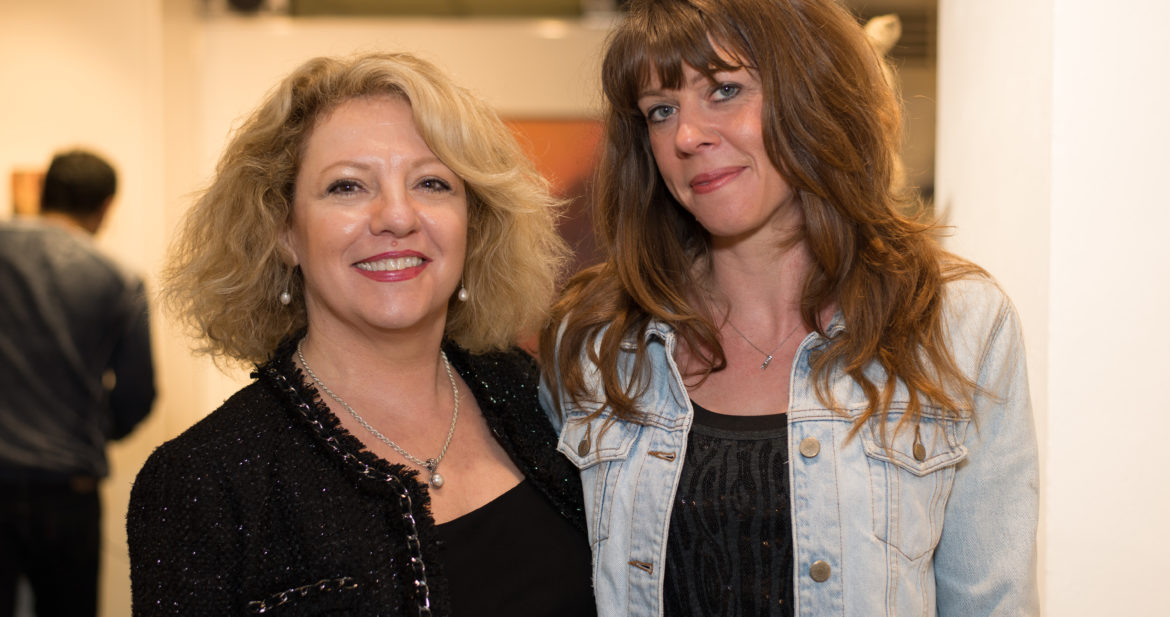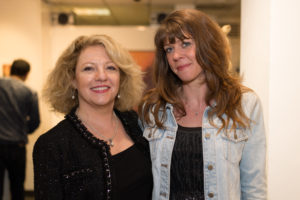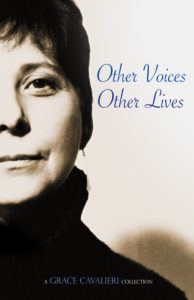I no longer remember when it was I first set eyes on that beloved literary dynamo, Grace Cavalieri. As a young poet, I came to know and love her voice, as I heard it in her poems and also on her radio interview show, The Poet and the Poem, then broadcast on WPFW. Grace’s is a voice full of contrasts, playful and philosophical, sexy and satirical, mature and sassy. Her range was and is inspiring.
We first became close at a literary conference at St. Mary’s College of Maryland, where I was invited to teach a workshop shortly after my first book of poems, Difficult Weather, was published. Grace was a senior faculty member of that terrific and now sadly defunct conference, founded and run by former Maryland Poet Laureate Michael Glaser, and sensed the nervousness in this newbie at the Friday night opening reading. Saturday morning, she showed up at the door of my tiny dorm room to walk me to breakfast, looking stunning in hot pink yoga pants and a shimmering white shirt. Over croissants and coffee, she drew me out and put me at ease. I soon learned that such generosity was simply her way, and that there was a legion of poets who had been nurtured by her.
It was around that same time that a very talented young writer showed up in one of the adult poetry workshops I then taught at The Writer’s Center. Though she was still in high school, Elizabeth Hazen had already outpaced the center’s classes for teenagers. My class had several well-published poets in it, but Liz was never intimidated, and her work was powerful and polished even then. I was particularly taken with what a natural and subtle ear she had for the music of poetry. She took several workshops from me, and then, through her college years — Yale, then Johns Hopkins – she stayed in touch. I believe that my feedback on her new poems and my faith in her work were useful to her over those years, and it was certainly wonderful to watch her poetry grow.
When it was time for my second poetry collection, Gut Punch Press, the indie press that had published Difficult Weather, had folded. My new manuscript had two intertwining strands, one of elegies, one of retellings of classical myths, and while a few publishers expressed interest, they all had doubts about the combination of both in one book. I asked Grace if she would take a look at it and give me some advice. I gave the manuscript for what would be Orpheus in the Park to her on a Friday. She called me the following Monday to say that she wanted to publish it herself, under the Forest Woods Media poetry imprint, The Bunny and the Crocodile. Working with Grace on the manuscript was one of several factors that re-ignited an early desire of my own to work in publishing. A few years later, my husband, James J. Patterson and I would meet Andrew Gifford, the founder and publisher of Santa Fe Writers Project, and team up with him to found Alan Squire Publishing, now an imprint of SFWP.
I gave the manuscript for what would be Orpheus in the Park to her on a Friday. She called me the following Monday to say that she wanted to publish it herself, under the Forest Woods Media poetry imprint, The Bunny and the Crocodile. Working with Grace on the manuscript was one of several factors that re-ignited an early desire of my own to work in publishing. A few years later, my husband, James J. Patterson and I would meet Andrew Gifford, the founder and publisher of Santa Fe Writers Project, and team up with him to found Alan Squire Publishing, now an imprint of SFWP.
One of our goals for ASP was to find new voices, and we were proud to bring first novels by Joanna Biggar and Mark E. Pritchard into print. So when Liz told me about the manuscript for what she hoped would be her first book, I was eager to take a look at it. The intelligence and honesty and sheer whole-heartedness of what would become the book Chaos Theories took my breath away. After conferring with Jimmy and Andrew, I took Liz out to brunch and said we’d like to do it at ASP. She said it felt like a beautiful circle had been completed. And I agree.
Writing is lonely work, and the chain of mentors, teachers, and publishers who support and care for each other lessens the isolation and warms the heart. Another goal of ours at ASP is to publish selected volumes from writers in the full throttle of their careers, a kind of legacy project, if you will. We kicked that off with The Richard Peabody Reader, a collection of poetry and prose that spans Richard’s amazingly diverse and prolific career. In October of this year, we will release Other Voices, Other Lives: A Grace Cavalieri Collection, a selection of Grace’s poetry and plays, as well as interviews from The Poet and the Poem. As Liz might say, it feels like a beautiful circle.
- Rose & Liz
- Grace Cavalieri



Leave a Reply